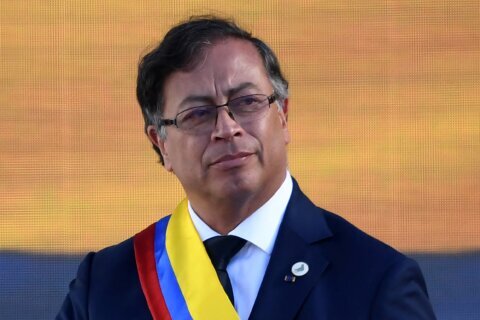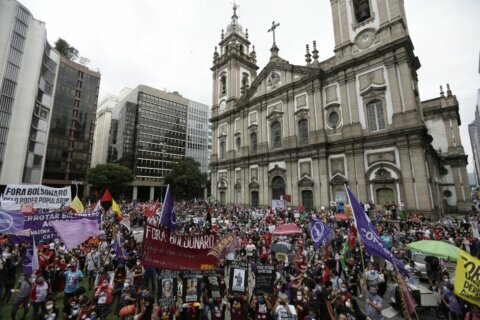By Taylor Barnes, CNN
Jair Bolsonaro will be inaugurated Tuesday as the fifth elected president since Brazil returned to democracy after the 1964-85 military dictatorship that Bolsonaro himself once praised.
The former army captain and far-right congressman, who campaigned as a political outsider and anti-corruption candidate, won a comfortable victory in October over his nearest rival in one of the most polarizing and violent political contests in Brazil’s history.
His supporters see a no-nonsense leader who will drain the swamp and tackle the rampant violence plaguing the country. His opponents fear that four years of a Bolsonaro presidency will threaten human rights and ecological preservation in the world’s fourth-largest democracy.
Bolsonaro takes office in a country of 200 million suffering from prolonged economic malaise, rising insecurity and a massive corruption scandal that rocked political and financial institutions.
A small number of foreign heads of state are expected at Tuesday’s ceremony, including regional presidents, Israeli Prime Minister Benjamin Netanyahu and Hungarian Prime Minister Viktor Orban. Agencia Brasil, a state news outlet, said the full list of foreign dignitaries would not be publicized before the event for security reasons.
Trump comparisons, ties
US Secretary of State Mike Pompeo will represent the United States at the ceremony and is expected to discuss unrest and human rights in Venezuela, Nicaragua and Cuba with the incoming leader.
The US State Department said Bolsonaro’s election presented a “historic opportunity for closer ties” between Washington and Brasilia.
Exchanges between the Trump administration and the incoming Brazilian government have been well underway even before Bolsonaro officially takes office: National Security Advisor John Bolton met the president-elect in Rio de Janeiro in November. His son, congressman Eduardo Bolsonaro, met White House adviser Jared Kushner in Washington in the same month.
Comparisons between the incoming president and Trump have abounded, earning Bolsonaro the moniker “the Trump of the tropics.” He is an avid social media user, publicly feuds with mainstream media outlets he calls “fake news,” and has cultivated an enthusiastic following among Brazil’s social and religious conservatives.
However, unlike Trump, Bolsonaro comes to the job with plenty of political experience: He spent seven terms as a congressman from Rio de Janeiro affiliated with a variety of political parties. His outsider status, however, meant he has little to show for those 27 years: Just two bills of the scores he authored ever became law, Reuters reported.
Bolsonaro has long courted outrage. He once told a congresswoman during a parliamentary hearing that she did not deserve to be raped because she was “very ugly,” as Brazil’s TV Globo reported at the time.
He also said he’d prefer to see his son “die in an accident” rather than have a member of his family be homosexual. Bolsonaro has pledged to define marriage as a union between a man and a woman, prompting the Brazilian bar association to encourage same-sex couples to marry before he takes office.
With his strong mandate, there is little indication Bolsonaro plans to back down from his trademark far-right tirades, or from his longstanding antagonism towards Brazil’s human rights community. One of his sons, a city councilman in Rio de Janeiro, shared a video montage of his father’s inflammatory statements days before the inauguration. Included in the video was a picture of his father holding a shirt with the slogan: “Human rights: the crap of thugs.”
Reversing environmental policy
Like his US counterpart, Bolsonaro has shown a willingness to pull out of international agreements and go it alone on the international stage.
Bolsonaro has flirted with leaving the 2015 Paris climate accord, and the foreign ministry in November withdrew Brazil’s offer to host a 2019 UN climate meeting “in light of the transition process to the recently elected administration” and citing budget concerns.
His nominee to lead Brazil’s foreign ministry, Ernesto Araújo, has called efforts to combat climate change a conspiratorial power grab by the global left on his blog, titled “Against Globalism.” Bolsonaro has also said “we need to put a stop to the demarcation of indigenous land.”
Bolsonaro was endorsed by Brazil’s powerful agribusiness lobby and has said farmers are excessively fined for environmental damage, prompting warnings from advocacy groups that a Bolsonaro presidency may lead to an open season on Brazil’s protected forests.
“His reckless plans to industrialize the Amazon in concert with Brazilian and international agribusiness and mining sectors will bring untold destruction to the planet’s largest rainforest and the communities who call it home, and spell disaster for the global climate,” Amazon Watch program director Christian Poirier said in a statement to CNN.
Foreign policy, Israel and migrants
Bolsonaro also announced he would revoke the outgoing government’s signature of the Global Compact for Migration, an agreement signed by a majority of UN member states in December and meant to facilitate orderly migration. Araújo, the foreign minister-designate, said immigration should not be dealt with as a “global issue.”
In another step in line with the Trump administration, Bolsonaro has vowed to move Brazil’s Israeli embassy in Tel Aviv to Jerusalem, the disputed city claimed both by Israelis and Palestinians.
“Bolsonaro told me it was ‘when, not if’ he moves the embassy to Jerusalem,” Netanyahu said during a visit to Rio de Janeiro ahead of the inauguration.
Gun ownership
Bolsonaro’s core constituency has long been Brazilian public security hardliners who believe leftist administrations have taken too soft an approach in a country with one of the world’s highest murder rates.
Legal gun possession is tightly restricted in Brazil, where civilians must pass through a long application process to obtain a weapon. Bolsonaro has vowed to loosen gun control laws, tweeting in late December that he would issue a presidential decree to guarantee citizens with no criminal background the right to buy a firearm.







